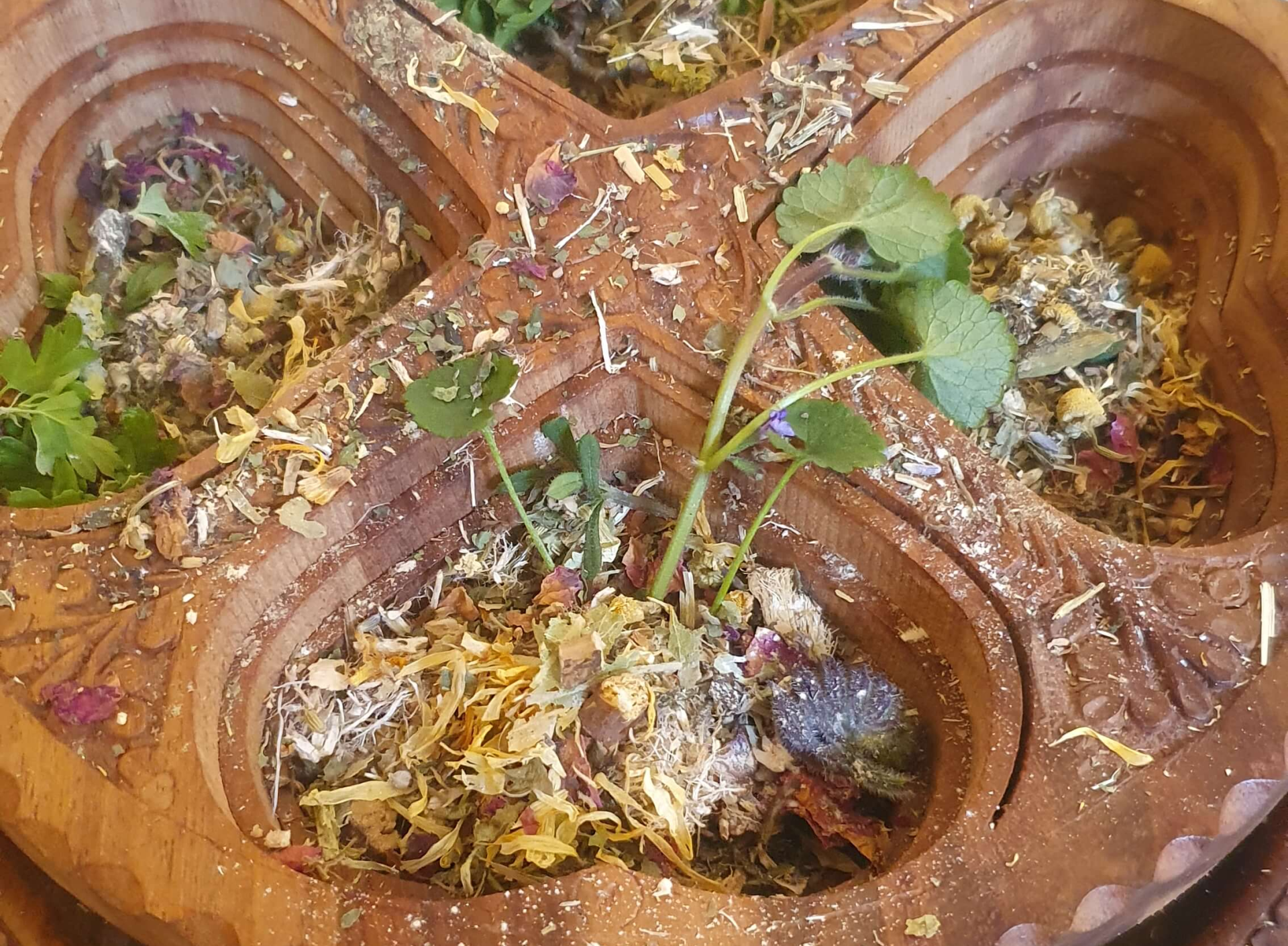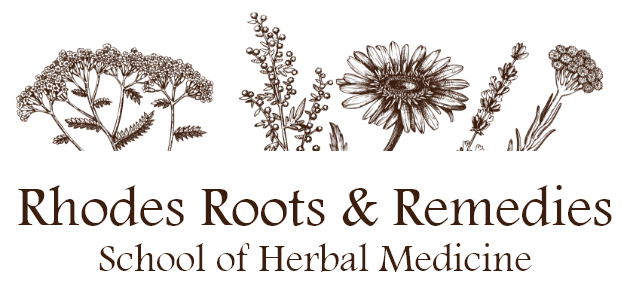Our school yurt, Grandmother Willow, is awakening from her winter slumber and bursting into life as our spring gatherings take place and our 2025 cohorts begin their journeys. I always love this time of year - seeing new first-year students take their first steps over the threshold, excited to see what experiences and adventures await them; giving massive hugs to our second- and third-year students who are returning to continue deepening their knowledge and skills. Feeling our herbal community take a deep breath in the sunshine infuses everyone with an inescapable warmth. To top it all off, we’ve had gorgeous weather for every single cohort so far, with the sun filling every corner of the yurt, the birds chirping and the sheep bleating - pure bliss!

We begin the spring gatherings for each cohort in the same way, with plenty of herbal tea, introductions, an invocation for the journey and each student setting their intentions for the year. Then, one of my favourite moments - the giving of the welcome gifts! I always love seeing the surprise and delight on first-years’ faces when they realise the great big ribbon-tied boxes are for them, the anticipation of the knowing second-years and the bittersweet appreciation of the third-years who know this is their final gift in this form. The boxes are opened, the smell of herbs fills the air and students get their first glimpse of the course books that will become personalised heirlooms, the twelve herbs they’ll build relationships with during the year and a few other goodies I won’t divulge to keep the surprise for future students. It’s all the core things they’ll need for their journey. And because I feel the knowledge and skills of herbalism are a gift, I think they should be given as such. (Besides, it’s much more fun for everyone!)
After this flurry of excitement, we come into focus again with a guided meditation and then begin soaking in the knowledge. We always cover the fundamental, more complex concepts we work with across the year at our in-person sessions because it makes it easier to ask questions and more natural to absorb when we’re face to face. Then we’ll massage these concepts deeper into our hearts, hands and minds during our live Zoom sessions between gatherings.
Our first-years began getting to grips with the elements (ether, air, fire, water and earth) - at the foundation of everything - their qualities and nature and how they combine into doshas (concepts of constitutions from the Ayurvedic perspective). Of course we had a play with each student exploring what they thought their constitution might be - something they’ll continue to develop an understanding of as we weave discussion of the doshas into everything we learn over the year. We introduced why taste is so fundamental to building our relationships with our herbs, as well as understanding the messages our bodies send us and had a preview of what’s to come in the year. One student brought seedlings for each person in her group, so our school tradition of sharing abundance has started off strong this year!
Our second-years were introduced to the wheel of the year in a unique way, as on our course we draw on the rhythms in nature it highlights overlaid with the ebb and flow of the doshas and elements, rather than any particular spiritual practices (although students can very much explore this on their own if it calls to them). Our focus is on tuning into the nuances of the music the rest of nature is playing so we can take up our own instruments and begin to play and dance in sync with the beat our bodies are compelled to move to once more. So we explored the spring equinox from all the angles we’re familiar with from year one, including tastes, doshas, qualities, remedy forms, herbs, etc. Within this framework, we then waded into the Ayurvedic waters of dinacharya (daily rhythm) and ritucharya (seasonal rhythm), weaving them into the context of our experience of the seasons here in the UK, because whilst ancient knowledge is timeless, it is a tapestry that is woven in the threads of the land, the climate, the flora and fauna from which it originates. Case in point, the difference between the longest and the shortest days in the Indian subcontinent is significantly smaller than the summer and winter solstices in the UK. So we calibrated. A great discussion of circadian rhythm and its influence on our lives was had. We also introduced the seven tissues - a way of looking at and understanding the impacts of both how we nourish ourselves, as well as how we unpick the development of imbalance in the body to get to the root cause of what’s bothering someone that never fails to blow students’ minds. Finally, we made two seasonal blends - one of dried herbs and one of herb-infused oils - for students to add to and transform into whatever types of remedies they like, giving them an opportunity for more practice of the skills they learned in year one.
Our third-years are always an intimate group of lovely people who have become very good friends. There is still plenty to learn, but by now they are more aligned with the pace of nature. There is less of a rush. There is more space to absorb, ponder, discuss and refine - integrating the knowledge and skills they have developed thus far into the spiral of life. There is also a significant amount of rapport, trust and safety that has been built within the group, so we can go very deep and very real. We added another layer onto our seasonal wheel of the year with its dosha dynamics - the six stages of life. We saw how they align with the seasons, with the ebb and flow of the elements. We looked at some of the more advanced nuances of listening to ourselves, our family and friends when providing support with herbs. How do we put the knowledge and skills learned into practice without the formality of clinical practice, but with the safety, effectiveness and awareness of our boundaries and limits? Sitting in the sun in the herb garden, we had quite a detailed discussion about how and when to help others. What if you can clearly see someone would benefit from herbal support, but they haven’t asked you for it? What if someone asks you for a herbal remedy, but you know they’re just looking for a quick fix or a ‘green pill’? What if someone is happy to take the remedies you create for them, but have no desire to change any of the other aspects of their life that are draining them of their vitality and perpetuating imbalance in the body? We’ve of course touched on all these topics before, but they’re landing at a deeper level now. And then we made our seasonal remedies - these with the intentions of filling up our kitchen apothecaries. In year one, there is so much excitement around the beautiful amber glass bottles, all the different topical remedies that can be made and the freedom that it brings. But once students get to year three, although those things are still exciting (and always will be), the focus is on ensuring herbalism is thoroughly infused into their daily lives - and the hub of that is the kitchen. So we foraged for nettles and got them infusing into apple cider vinegar in sizeable jars that will be pressed when ready at home and mixed up a delicious spring/digestive herbal tea blend, settling into companionable conversation as we filled our own tea bags - a task always better to do in good company.
Of course, our fabulous lunches by brilliant local chef and second-year student, Lucy May, have to be mentioned. Everyone’s eyes roll back in bliss and the never-to-be-settled debate of - can I possibly save my divine dessert for an afternoon snack or is it completely futile to resist and just eat it now? - occurs. One of our students said between mouthfuls - ‘This is the kind of food you get on a retreat! But I suppose this really is like a retreat, isn’t it?’ I couldn’t agree more! Second-years brought books for fellow students to peruse and borrow and a few card decks were shuffled and pulled from. Third-years swapped favourite recipes and chatted about their lives. And because the sun was smiling on us, we enjoyed our post-lunch sessions at the picnic tables in the herb garden, so we could be amongst the plants, seeing them in their young forms at this time of year (and so we could make sure we stayed sharp after all that edible joy).
We’ve still got one more first-year cohort to welcome as they begin their journeys this coming weekend - and I know many of them have been counting down the days! (I have been, too!) And then we’ll all settle into our weekly rhythm of live Zoom sessions (more on that in another article).
It is nothing short of an honour to get to walk with each and every one of our students on their herbal journeys and pure joy for me to meet and welcome every new student who crosses Grandmother Willow’s threshold, to give massive hugs to our returning students. This year’s adventures have just begun and I cannot wait to see how they unfold!
If you’re here in the UK, you’re very welcome to join us on our intensive herbalism course - Awaken Herbal Wisdom - which spans all four seasons. With up to three years of development available, our course gets herbalism both deep into your bones and your daily life, without either having to do a clinical degree or a traditional full-time apprenticeship. Although it is intense, it’s suitable for a wide range of herbalists, including beginners! You can learn more about our herbal medicine course here.
Be sure to join our mailing list to hear more about what the current cohorts are up to, learn some of the golden nuggets that emerge from our sessions and receive other school updates. Enrolment opens after dates are announced each spring for the following year, and places are filled on a first-come, first-served basis. If you’re ready to join us on the journey, you can request an application to join an upcoming cohort soon.
Whatever the next step is exploring herbalism, I hope you enjoy the journey!
At Rhodes Roots & Remedies School of Herbal Medicine, our practice of herbalism is rooted in the belief that we must remember, reclaim and relearn our knowledge of our bodies, our autonomy and how to work with plant medicine in order to bring control of our own health back into our families and homes for a sustainable future for ourselves and the planet. Through our intensive herbalism course, we facilitate the development of confident, empowered herbalists, attuned to the messages of their bodies and the natural world. Living the deep wisdom of herbal medicine within themselves, their homes and their communities, they uplift themselves and others, creating a stronger society organically. We do hope you'll join us on your journey!

